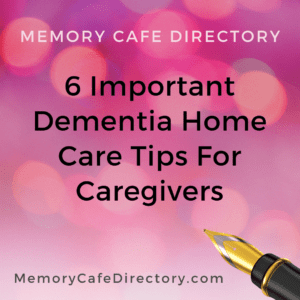Memory Cafe Directory posts and/or links to retailers can be advertising, sponsored, or affiliate links. We may earn a small commission from them. Thank you.
The World Health Organization (WHO) reports that over 55 million people across the world have dementia. Over 60 percent of these 55 million live in countries that are classified as low and middle-income countries. There are many types, but Alzheimer’s Disease is the most common type of dementia. Lewy Body Dementia and Vascular Dementia are just two other examples.
According to the Alzheimer’s Association, more than six million people in the US have Alzheimer’s disease and related dementias. As of 2023, the exact number of people dealing with these conditions is around 6.7 million. The number of people who have dementia in the United States is only growing, and thus comes the need for family members and other people around them to know how to properly provide care.
Family caregivers are often dementia caregivers of an older adult. Incorporate the following tips into your care plan to help you improve the personal care you provide and make a positive impact on your loved one’s health conditions.
1Establish a Structured Routine
Regardless of the forms of dementia people have, they often thrive in a structured environment. Establishing a daily routine is the best thing you can do to help minimize confusion and anxiety. Plan regular times for waking up, meals, activities, and bedtime. Display a visual schedule in a prominent location to help the person anticipate and understand the daily routine and what those daily activities may be.
Keep in mind that flexibility is essential. The needs and abilities of the person experiencing dementia symptoms may change over time. Maintaining consistency and predictability can greatly reduce agitation and enhance the overall well-being of the individual as they navigate their daily life.
2Create a Safe Living Space
Modifying the living environment to ensure long-term care safety is vital when caring for someone living with dementia. Conduct a thorough assessment of the home, identifying potential hazards to improve your in-home care. You may have to make some physical changes to your own home to address some safety issues.
Consider installing grab bars in bathrooms, removing or locking away toxic substances, and securing furniture to prevent falls. Consider using alarms or monitoring systems that notify you if they leave the premises unattended. Boosting safety features by adapting the living space to accommodate their needs can significantly reduce the risk of accidents and provide them with a sense of security.
Good lighting can go a long way in reducing safety concerns. Visual cues like labels and signs can be helpful for those with any form of dementia. Bright colors can help distinguish between different surfaces or objects.
3Seek Professional Help
You may find dealing with difficult behaviors are new challenges for you. Seeking professional help when caring for a person living with dementia is a very good idea. Healthcare professionals can provide accurate diagnoses, treatment options, and care planning tailored to the patient’s needs. They can offer guidance on managing challenging behaviors, educate you about the disease, and provide emotional support.
Professionals can also assist with respite care and end-of-life considerations. Remember, reaching out for professional assistance is not a sign of weakness but a proactive step to ensure the best possible care for your loved one and yourself. Professional caregivers from dementia care services like a home health care agency can provide additional help with daily tasks. They can help you support a loved one who has received a dementia diagnosis, and give you a valuable short break, too!
Nurses Support Medical Needs
Many nurses are specially trained to provide support to those living with dementia. Many of these nurses are trained in gerontology and can assist with an aging parent. Some also go through a rigorous adult gerontology nurse practitioner online program to get to this position. These nurse practitioners can provide the support needed for dementia patients, over and above many other medical conditions.
According to the University of Indianapolis, an adult gerontology primary care nurse practitioner (AGPCNP) plays the vital role of improving the functionality and quality of life for adults in a variety of settings. Such settings also include home-based treatment, meaning that these nurses can provide at-home professional care to people with dementia when needed.
4Effective Communication Strategies
When you’re providing care assistance for someone with dementia, communication provides unique challenges. As dementia progresses, a person’s ability to communicate starts becoming even more difficult. Combined with behavior changes and personality changes, a decline in communication skills can make it even tougher.
Nonverbal Cues Help
The best way to ensure effective communication is by maintaining eye contact with the person and using simple and clear language. Make sure you’re speaking slowly and calmly. At all costs, avoid talking down to them or using complex sentences. You should also use non-verbal cues like gestures and facial expressions to convey your message better.
Active Listening is Critical
As for listening, you also have to be attentive and patient. Allow them sufficient time to fully express themselves. Remember that body language and tone of voice can often convey more meaning than words alone. A compassionate and understanding approach to communication can be the most important thing to foster a stronger connection between you and the person living with dementia.
5Engage in Meaningful Activities
Mental Health professionals suggest engaging in meaningful activities can help maintain cognitive function and reduce feelings of frustration and boredom. Tailor activities to the person’s interests and abilities, focusing on tasks they enjoyed in the past. Activities such as puzzles, music therapy, gardening, or reminiscing with old photographs can stimulate the mind and bring joy to their day.
Memory Joggers for Recall Exercise
One way to “jog” the brain function is through recall. Memory Joggers is a free, fun, engaging way to engage with your loved one. Read the first part of a familiar phrase, and give them the simple task of completing it with just one word.
Open-ended questions can be confusing to the person living with dementia. Asking them for one word can help them focus and enjoy the activity.
We all love trivia – but it’s helpful, too. Each time we recall a memory we reinforce the connection to that memory. For many, short-term memory loss can be helped through regular recall prompting.
Not only can this provide some valuable mental exercise, Memory Joggers can help you spend some quality time with your loved one.
Engage Socially
Encourage social interaction through family visits or joining local support groups for individuals with dementia. Being involved in purposeful activities helps maintain a sense of identity and improves the patient’s overall well-being.
A care partner can benefit from support groups, too. Sharing your caregiving journey with others who share your challenges can provide a very special kind of help. Taking care of a person living with dementia is difficult. These groups can help caregivers cope and carry on in a healthy manner.
6Different Stages of Care
Power of Attorney
At some point, Alzheimer’s patients can lose the ability to make sound decisions. A Power of Attorney document can help you help them by allowing you to act on their behalf. This gives you a greater ability to help them make medical decisions. Warning signs can be difficulty paying bills or making sound financial decisions.
It is recommended to consider a Power of Attorney during the early stages of dementia. This gives your loved one a greater ability to understand the need and feel comfortable with the process.
Home Care Services
As mentioned earlier, professional support may be needed eventually. Home Care services can assist those who might have a full-time job, but sill have the responsibility for a loved one. Getting some assistance in the late afternoon may be just the boost you need to maintain your own energy.
Memory Care Community
Regardless of the types of dementia people experience, it is very likely a Memory Care Community may be needed eventually. These carry a hefty cost of care, but can provide the best Alzheimer’s care possible. As a transition, some people may benefit first from an Assisted Living environment, but then need Memory Care later. Every situation is different and there is a solution for everyone.
Important Tips For Caregivers
Dementia is currently the seventh leading cause of death in the world. It is also one of the major causes of disability and dependency, especially among older people. While a fully-working treatment plan for dementia may not always work, one can at least provide them with the best possible care, and such care always starts at home.
If you have a loved one at home who has dementia and you want to make them feel as comfortable as possible, keep these dementia care tips in mind.





